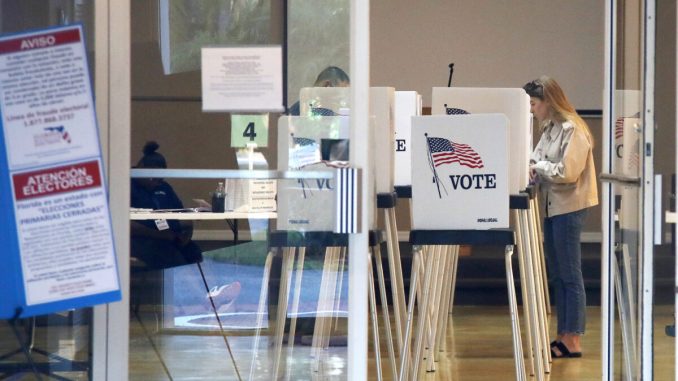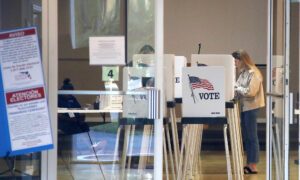

Commentary
Like Georgia Gov. Brian Kemp, Florida Gov. Ron DeSantis is being pilloried in the mainstream media because he had the audacity to sign a bill that protects election integrity in the Sunshine State. How dare he!
However, when one takes a clear-eyed look at the law, it’s quite apparent that Florida’s new law, like Georgia’s, is nothing more than an effort to increase election integrity while making it more difficult to commit electoral fraud.
Yet, that’s not how the new law is being portrayed in the mainstream media. Perhaps it’s time for some fact versus fiction pertaining to the Florida election law.
Fiction: Florida’s new law is a veiled attempt at voter suppression.
Fact: Florida’s new law is absolutely not about voter suppression.
The bill signed by Gov. DeSantis strengthens Florida’s existing voter ID statute. In the Sunshine State, under the new law, all voters must present a government-issued ID to vote in-person. This is not voter suppression. It’s voter recognition.
Fiction: Florida’s new law is Jim Crow redux.
Fact: Florida’s new law is the antithesis of Jim Crow.
Despite the mainstream media’s fervent attempts to paint the new Florida election integrity law as Jim Crow 2.0, this is simply not true.
In the Jim Crow South, voting laws were passed to specifically target certain groups (namely black Americans) from exercising their God-given right to vote. This dastardly practice came via poll taxes, literacy tests, grandfather clauses, and all other types of laws intended to prevent specific groups from casting ballots.
Absolutely nothing in the new Florida election integrity law, in any manner, prevents specific groups from voting. Playing the Jim Crow race card in relation to the Sunshine State’s straightforward voting law is a disservice to those who fought for equal voting rights, which was achieved decades ago.
In 1965, Congress passed the Voting Rights Act, which according to History.com, “aimed to overcome legal barriers at the state and local levels that prevented African Americans from exercising their right to vote as guaranteed under the 15th Amendment to the U.S. Constitution.”
Moreover, since the 1965 Voting Rights Act was passed, voting among blacks has skyrocketed, and remains unencumbered to this day. As History.com puts it, “the Voting Rights Act gave African American voters the legal means to challenge voting restrictions and vastly improved voter turnout. In Mississippi alone, voter turnout among Black people increased from 6 percent in 1964 to 59 percent in 1969.”
Fiction: Florida’s new voting integrity law is unnecessary because voter fraud doesn’t exist.
Fact: Florida’s new law is necessary because voter fraud does exist.
Before the pandemic, in-person voting was the norm in America. Mail-in voting, though allowed in most states (including Florida), was not the default. Moreover, the idea of mailing ballots to all eligible voters on outdated and error-prone voter rolls is absurd. However, that’s what happened in several states, under the guise of COVID-19.
The new Florida law bans mass mail-in voting, which studies show is much more likely to result in fraud. Even former President Jimmy Carter has spoken out about mail-in voting. “Voting by mail creates increased logistical challenges and the potential for vote fraud,” was the conclusion reached by Carter and James Baker in their 2005 report (pdf), “Building Confidence in U.S. Elections.”
Of course, all of this is lost on the mainstream media, which continue to perpetuate the completely false notion that Florida’s election integrity law is an underhanded attempt to skew elections.
Most Americans support the primary elements of the new Florida law, including voter ID.
Instead of repudiating governors like Ron DeSantis and Brian Kemp, the mainstream media should champion their efforts to ensure that elections are as free and fair as possible.
Chris Talgo is senior editor at The Heartland Institute.
Views expressed in this article are the opinions of the author and do not necessarily reflect the views of The Epoch Times.





Be the first to comment